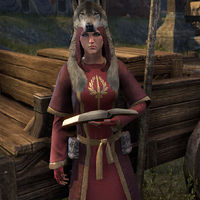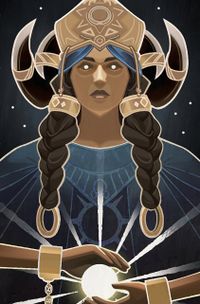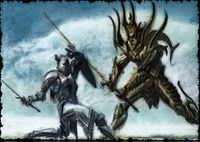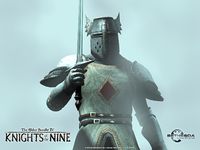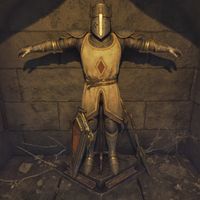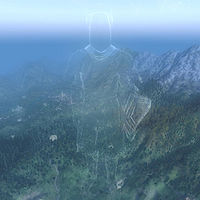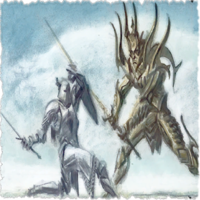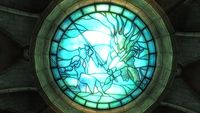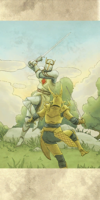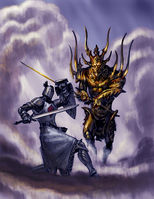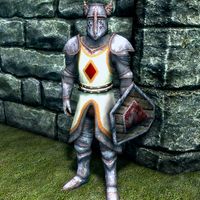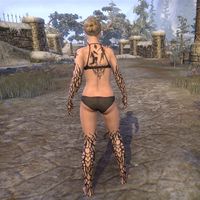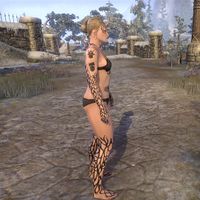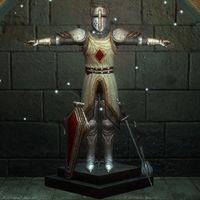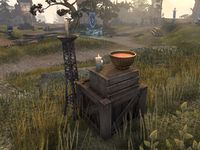Lore:Pelinal Whitestrake
| Pelinal Whitestrake | |||
|---|---|---|---|
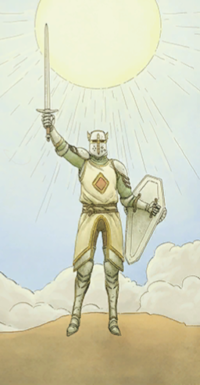 Pelinal Whitestrake holding the Sword of the Crusader aloft Pelinal Whitestrake holding the Sword of the Crusader aloft
|
|||
| Race | Demigod (Ada) | Gender | Male |
| Died | 1E 243 Vanua |
||
| Resided in | Cyrodiil | ||
| Appears in | Oblivion | ||
Pelinal Whitestrake was a legendary (and infamous)[1][2] Demigod who fought alongside his fellow Demigod Morihaus as the champion of Queen Alessia during the Alessian Slave Rebellion of the early First Era.[1][3] He possessed the Crusader's Relics, which were given to him by the Eight Divines.[4][5] Legends say he often had stretches of homicidal madness, during which he slew indiscriminately and took a toll on the very landscape itself.[6]
Pelinal is also supposedly but one name for the "legendary immortal hero" who, according to legend, conquered all of Tamriel by himself in the late Merethic Era.[7] However, he never united the various provinces he conquered under a single banner, as he was known to wander, build up kingdoms, and inevitably abandon them to wander again.[8] Though some doubt has been placed on the idea of all these feats belonging to the same indiviudal.[UOL 1]
Titles[edit]
The name Pelinal means "glorious knight" in elvish.[3] It is a corruption of Pelin-El, which means the Star-Made Knight.[9] One story gives him the name Pellani,[UOL 2] which became the Old Cyrodilic word for "outsiders" over time for the Wild Elven tribes.[10] He was referred to in many different ways during the Alessian Rebellion, and was known as the Whitestrake, Pelinal Insurgent, Pelinal the Bloody, Pelinal the Blamer and Pelinal the Third.[3] This last moniker, "Pelinal the Third", could indicate that he is a "god guiser" who had incarnated twice before.[3] Another theory suggests that he is the third vision received by St. Alessia in her prayers to the gods for mankind's freedom from the Ayleids.[3] He is often referred to as the Divine Crusader.[4] Khajiiti legends remember him as the White Snake.[11] His close connection to Alessia sometimes had the pair referred to as Pelin-al-Essia.[12] Yet another title for Pelinal is Convalent Eradicator.[13]
It is claimed that he had other names as an immortal sorcerer king, such as Ysmir, Harrald Hairy Breeks, and Hans the Fox.[8] Though some have claimed that these names were simply conflated with Pelinal and actually belonged to separate figures.[UOL 1]
Divinity and Nature[edit]
Pelinal described himself and Morihaus, in a conversation between the two, as "ada", described as a type of being able to change things through love, as Morihaus did through his creation of the Minotaurs,[14][15] and the same classification given to his half-divine enemy, Umaril, who, being "of the blood of the ada", would "never know death".[16] Furthermore some sources classify Pelinal as a Demigod.[17] Pelinal had many parallels to the Missing God Lorkhan and his various aspects. It is said that a man once called Pelinal "the Shezarrine"; the man was then smothered by moths that night.[14] Furthermore when the Nords first bore witness to Pelinal, they claimed that Shor had returned, though Pelinal spat at them for profaning the name of Shor.[18] Another link is a book of dubious nature that was supposedly authored by Pelinal that entails a conversation with the Heart of Lorkhan on the nature of the Aurbis.[19]
Pelinal was said to have entered the world like a Padomaic, borne of Sithis and all the forces of change therein.[6] This is consistent with myths of Lorkhan that speak of his Padomaic nature and him being begat by Sithis.[20] Pelinal was also described as having been a "diamond soaked red with the blood of elves" whose "facets could un-sector and form" into a "man whose every angle" could "cut" Alessia's jailers, and who was called PELIN-EL.[9] Beyond this it was said under Pelinal's armor was a gaping chest with no heart, only a red rage shaped diamond that sang like a mindless dragon.[6] Several mythical feats are attributed to Pelinal, including having a left hand "made of killing light",[3] and somehow erasing an entire month from the elvish calendar.[13] Also despite his hatred of god-talk, Pelinal himself spoke of a twin nature he shared with Aka, and secret faces that he and his twin have worn in heaven since even before the days of Convention, speaking to Pelinal's ancient nature.[6][21] Pelinal also exclaimed "Umaril dares call us out, for that is how we made him!", when addressing Aka.[6]
It is possible that Pelinal was capable of time travel or possessed the ability to see future events.[UOL 1] He allegedly shouted the name of future ruler Reman hundreds of years before his birth during the days of the Alessian Rebellion.[16] Additionally, he was once stated to wear armor from a future time,[9] though there is no scholarly consensus on the dating when the texts that claim these things were written.[3] When encountering the Hero of Kvatch, the spirit of Pelinal would claim that he wasn't sure whether others that he'd already encountered within his "dream" had come before or after the Hero.[22] The deeds of Pelinal and his various aliases throughout many different ages of Tamriel's history are by some accounts the result of various incarnations or merely the actions of a "composite hero".[3][23][UOL 1] Pelinal had association with animal imagery, namely the fox and wolf,[24][8][25] animal totems of Shor and Mara respectively.[26]
Pelinal's elven enemies viewed him as a mere Man, specifically a Nibenay warlord. This caused the prideful elves to be confused about how so many of their kind saw defeat at the hands of Pelinal.[27][28][18]
Pelinal also carried strange weapons and armor gifted by the Eight Divines.[29] His reputation varies widely. Among Imperials, he is a hero and saint who helped free Cyrodiil from oppression.[4][2] Among mer, he is the vicious Nibenay warlord who led the Elven Pogrom, and the Khajiit revile him because he mistook them for another type of Aldmeri, slaughtering many before his mistake became apparent.[28]
History[edit]
Wandering King[edit]
One legend purports that Pelinal came to Tamriel from Atmora in the Merethic Era as a part of Ysgramor's Five Hundred Companions during the Return. This tale is somewhat conflicting as it seems to mention several of Pelinal's names or incarnations as different members, while also mentioning Pelinal himself separately. It also mentions many anachronistic figures.[UOL 3]
In Merethic Era Tamriel, it is believed that Pelinal under various names built a reputation as a wandering hero, sorcerer, and warrior.[8] Pelinal in his wandering would gather armies, conquer lands, rule over them as king, only to inevitably abandon them and repeat the process.[8] Pelinal wandered this way so much that he was considered to have conquered the whole of Tamriel over time, although never under a single banner given his propensity to abandon his kingdoms.[7] Though there is some uncertainty whether all these feats were actually accomplished by Pelinal, or whether he was conflated with other Mythic figures.[UOL 1]
The Ayleids of Cyrodiil, ruled over their Nedic slaves with a brutal hand.[24] The earliest Cyro-Nordic legends remember these cruel Ayleids being kept at bay by the god Shezarr who fought them on mankind's behalf. Eventually Shezarr vanishes from Cyrodiil, presumably to help other humans elsewhere, allowing the Ayleids to enslave the Nedes.[30] These legends have possible links to Pelinal given his speculated nature as the Shezarrine.[14]
The Alessian Rebellion[edit]
In 1E 242[31][30][32] a Nedic slave known as Alessia prayed to the goddess Kyne that the Nedes could garner the might to take vengeance on their Ayleid masters for their cruelty. In return, Kyne sent down her Demigod son Morihaus and by his side was Pelinal who was arrayed in futuristic-looking armor. The pair arrived at the camp of Alessia having already killed several Ayleid chieftains; the stage for Nedic rebellion was set under the trio, with Alessia being the Slave-Queen.[9] Pelinal's armor and weapons were in fact gifts from the Eight Divines, who personally blessed Pelinal as their champion in the crusade against the cruel Ayleids.[4] The armor was effective, as no Ayleid weapon managed to pierce it.[16]
He served the revolution by slaying the Sorcerer-Kings of the Ayleid city-states in single combat, including Haromir of Copper and Tea, Gordhaur the Shaper, and the Fire-King Hadhuul.[16] He was by some legends lover of Alessia,[2] though Pelinal is expressly stated to have loved the hoplite Huna, who he had raised up from a grain-slave and loved well.[16][UOL 1] However, when Huna was killed by an arrow of Celethelel the Singer, Pelinal would descend into several flights of madness during which he cut vast swathes in mindless fury to avenge him. During some of these rampages, Pelinal was said to have turned whole swathes of land to Void, making the gods themselves reach down and offer him succor, so he "no longer had the will to kill the earth in whole".[16][6] Alessia had to make sacrifice to the Eight Divines during these swaths of madness to keep them from leaving in their disgust.[16]
According to tradition, Pelinal was served by Vilius Tharn, "Blade-Serrator and Master of the Abbatoir", a claimed ancestor of the Tharn family.[33] Alessia presented Morihaus and Pelinal coronets with sword's surmounted on them to represent their natures as the living weapons of the Empire.[34]
Around this time, the Ayleids to help even the odds made a pact with the Daedric Aurorans of Meridia, and appointed the most powerful and terrible sorcerer-king as their champion, the half-elf Umaril the Unfeathered.[16] As well as being an Ayleid, Umaril had a divine father, giving him the blood of the ada, and for the first time it was Pelinal who was challenged to battle by Umaril which enraged the Star-Made Knight.[16]
After Umaril called him out, Pelinal took to personally leading the armies of rebellion and helped overtake all of eastern Cyrodiil in a swath of bloody fury.[18] Pelinal then broke down the doors of Vahtache freeing the Nedic prisoners who lay within.[18][35] He later freed the Thousand-Strong of Sedor, a famous Nedic tribe of the age.[18] Pelinal then committed a pogrom that consolidated northern Cyrodiil for the Men-of-kreath, his white hair having gone brown at this point with the sheer amount of elf blood that had stained it.[18]
During one particular bout of madness when Pelinal was committing a pogrom of elves, he wandered into the lands of the Khajiit who he mistook for elves.[28] Pelinal slaughtered the Khajiit in great number; the cat men being naturally skilled climbers attempted to escape him by climbing a nearby mountain, but Pelinal in a demonstration of his tremendous power wrestled with the mountain until he too stood atop it.[11] The Khajiit prayed for divine intervention and received it from the King of Time, Alkosh. The two beings did battle but Alkosh ultimately defeated Pelinal and shouted him out of Elsweyr, forming a Time Wound in the process.[11][36][UOL 1] This allowed Pelinal to realize his error of mistaking the Khajiit for elven kind.[28]
Towards the end of the war as rebel forces began moving closer to the White-Gold Tower, the Ayleids attempted to blockade the northern bridge to the city.[18][2] Alessia's falconers traveled to Skyrim seeking Nordic aid.[18][2] The Nords came to reinforce the armies and upon laying eyes on Pelinal, said that Shor had returned.[18] Pelinal was angry at this god-talk but led them anyways.[18] An enraged, Pelinal assaulted their lines and slaughtered all the Ayleids holding Heldon Bridge – an act which became known as "Pelinal's Midyear Massacre" in later Eras.[2][13] Pelinal then led the Nordic and Nedic army into the center of Cyrod.[18] He destroyed a wave of Thundernachs that Umaril had sent at the rebellion armies, and later carried his beloved friend Morihaus to Zuathas the Clever-Cutting Man for healing when the Demigod had fallen to a volley of bird beaks.[18] At the Council of Skiffs the Nedes and Nords alike showed great fear to storm the White-Gold Tower to the point Alessia gave council for delay.[18] This infuriated Pelinal who saw the hesitation as cowardly and in a move of brashness stormed for the Citadel alone.[18]
Death[edit]
Pelinal and Umaril's confrontation took place in the White-Gold Tower itself also spilling into the nearby Ayleid settlement of Vanua.[22][37] Pelinal arrived to the throne room of White-Gold alone, and all around him "dead Aurorans lay like candlelight". Surrounded by the last of the Ayleid sorcerer-kings and their "demons", each one "heavy with Varliance". Pelinal called Umaril to single combat. Umaril first weakened Pelinal by sending in soldiers whom he had been saving for that moment, knowing full well they would die, as Umaril had grown fond to ruin-from-afar tactics. The warriors of Umaril bore weapons heavy with Varliance, wrought by Umaril himself, and so could pierce Pelinal's armor.[37][38] It was only after Pelinal was bleeding and wounded that Umaril finally came down to fight him. Pelinal slew Umaril nonetheless, but his victory was short-lived. Umaril had managed to deal Pelinal a mortal wound[21] and the other elf kings, angered by Pelinal's insults against the ancestry of all those who took ship from Old Ehlnofey, descended upon him in a mad frenzy, and cut him into eight (by some sources nine)[UOL 2] pieces in mockery of the Divines, and carried them away, leaving only his head as a gift to Alessia. The next morning, those who remained either ran when Morihaus shook the whole tower with a bash from his horns, or were slain. Pelinal's head was then found by Morihaus, kept alive in torment by Ayleid magics, and was said to have spoken things of regret.[37][24][39][4][40][27] Pelinal informed Morihaus that Umaril in his cleverness had bound himself to the realm of his mistress Meridia and with this Daedric nature was able to cheat death.[4][24] Pelinal warned that he would no longer be able to protect men from the wrath of Umaril but Morihaus was confident that when the time was right, his uncle would come again, as he was "blood made glorious", and so would return, as "fox animal, or light".[4][24]
Legacy[edit]
The defeat of Umaril by Pelinal and the taking of the depleted Citadel by Morihaus spelled the effective defeat of the Ayleid resistance, the First Empire was born and Alessia claimed herself the first Empress of Cyrodiil.[30] A circlet was crafted with three red diamonds upon it to commemorate the three most crucial figures to the formation of the Empire, one diamond for Alessia, one for Morihaus, and one for Pelinal.[41]
Despite his death, he was supposedly present at Alessia's death bed years later. He described another half that along with himself would take her up and reveal their true faces, "which eat one another in amnesia each Age", to her.[21] Mannimarco claimed that Pelinal could explain his whereabouts during the Dragon Break, despite this event occurring roughly a millennium after his death.[42]
While there are those who honor his legacy, Pelinal became known as a controversial or even infamous figure to some.[1][2][11] At some point after Pelinal's death, scholars of the topic would gather to re-enact the battle between Pelinal and Umaril, using well-crafted illusion magics to replicate the appearance of Umaril's armor.[43] Some of these scholars even tattooed imagery of this historic battle on their bodies.[44][45] Saint Kaladas had dreams in which he believed Pelinal Whitestrake spoke to him which drove him to build the Great Chapel of Zenithar in Leyawiin.[46][47]
In 2E 582, the powerful golden Dragon Nahviintaas emerged in Anequina , following the release of the great dragon Kaalgrontiid and his dragon followers from the Halls of Colossus.[48]. He lead two other dragons, Lokkestiiz and Yolnahkriin, to pose as the returned gods of the Khajiit, Alkosh and the moons Jone and Jode, and take over the temple of Sunspire, where he attempted to expand the Time Wound left from Pelinal's fight with Alkosh via his Thu'um, in the hopes of causing a Dragon Break to rewrite time and restore draconic rule. This plan was foiled by the Undaunted, who entered the temple grounds and slew the dragons before they could achieve their goal.[49][50][11]
In 3E 433, Umaril the Unfeathered had returned to Nirn to take revenge on the Gods. A prophet of the Nine appeared stating that the Nine Divines needed a divine crusader reborn.[4] A champion would rise to the occasion and, after completing a pilgrimage to the Wayshrines of the Nine, meet with Pelinal's ghost personally above the White Gold Tower. The spirit of Pelinal would acknowledge that only great need made the gods allow the meeting, and direct the champion to retrieve the first of the Crusader's Relics. The champion would than go on to collect the Crusader's relics, receive the blessing of Talos, be proclaimed an embodiment of Pelinal Whitestrake, and utterly destroy Umaril, eradicating his very spirit through the blessing of Talos to deliver him the final death Pelinal could not.[51] The champion was named the new Divine Crusader of the Knights of the Nine, an order of knights who would go on to quest in Pelinal's honor.[29] Pelinal was remembered as one of the greatest warriors in the history of Tamriel, compared to the likes of Tiber Septim, Vilus Nommenus, and Ysgramor.[7][52]
Crusader's Relics[edit]
The Crusader's Relics are a set of Aedric artifacts, created by the Eight Divines and given to Pelinal Whitestrake, the Divine Crusader. The set includes a suit of armor, a shield, a mace and a longsword, which mold to the needs of the wielder and increase their proficiency in the School of Restoration. The artifacts were used by Whitestrake to banish Umaril the Unfeathered, an Ayleid Sorcerer King. In the battle, Umaril had dealt him a fatal blow, and with his death the relics were scattered and lost for a time. The contemporary writings contained within The Song of Pelinal mention that the Crusader's Relics came from the future.
Gallery[edit]
Notes[edit]
- In an out-of-game text, the names Harald Hairy Breeks and Hans the Fox were mentioned among Ysgramor's Companions, and a couple others in their number were said to have "ran once with the Pelinal".[UOL 3]
- Some sources suggest Pelinal spoke with an Early Modern English dialect.[13][53]
- Along with implications that support the idea in his in game novel, The Song of Pelinal, Michael Kirkbride has stated in several of his out of game posts that Pelinal was a cyborg or construct of some kind.[UOL 1]
- Pelinal is said to have been a "diamond soaked red with the blood of elves" whose "facets could un-sector and form" into a "man whose every angle" could "cut" Alessia's jailers, and who was called PELIN-EL. It is said that, under Pelinal's armor, there was a gaping chest with no heart, only a "red rage shaped diamond that sang like a mindless dragon". This red diamond from which Pelinal is said to have formed might have been the Amulet of Kings, also known as the Red Diamond.[6][9][54]
- At some point after the Soulburst, mysterious slate-skinned figures, known as Red Diamond Guardians, periodically appeared in the Imperial City to fight the Daedra. Each one had the Red Diamond encrusted upon their torso.[55] No one knew where they came from or where they went after each fray. Pelinal himself has been described as a star-made knight who formed from a red diamond, and had a red diamond that sang like a mindless dragon in his chest. Given the resemblance, its possible there might be some connection between these Red Diamond Guardians and Pelinal.[6][9]
See Also[edit]
References[edit]
- ^ a b c Shezarr and the Divines — Faustillus Junius
- ^ a b c d e f g Predicant Maera's dialogue in ESO
- ^ a b c d e f g h The Song of Pelinal, v 1
- ^ a b c d e f g h The Prophet's dialogue in Oblivion
- ^ Josette Ondre's dialogue in ESO
- ^ a b c d e f g h The Song of Pelinal, v 6
- ^ a b c Hallgerd's Tale — Tavi Dromio
- ^ a b c d e Before the Ages of Man — Aicantar of Shimerene
- ^ a b c d e f The Song of Pelinal, v 2
- ^ The Wild Elves — Kier-Jo Chorvak
- ^ a b c d e Moon-Bishop Azin-jo's dialogue in ESO: Elsweyr
- ^ Aurbic Enigma 4: The Elden Tree — Beredalmo the Signifier
- ^ a b c d The Song of Pelinal, v 10
- ^ a b c The Song of Pelinal, v 5
- ^ On Minotaurs — Nonus Caprenius, Temporarily Unaffiliated Scholar of Imperial Antiquities
- ^ a b c d e f g h i The Song of Pelinal, v 3
- ^ The Footsteps of Shezarr — Sister Priscia Stolvo
- ^ a b c d e f g h i j k l m n The Song of Pelinal, v 4
- ^ The Library of Dusk: Rare Books
- ^ Sithis
- ^ a b c The Song of Pelinal, v 8
- ^ a b Pelinal Whitestrake's dialogue in Oblivion: Knights of the Nine
- ^ Captain Kaleen's dialogue in ESO
- ^ a b c d e The Adabal-a — Morihaus
- ^ Star-Made Wolfshead costume in ESO
- ^ Divines and the Nords — High Priest Ingurt
- ^ a b Frostbitten Journal
- ^ a b c d Pocket Guide to the Empire, 1st Edition: The Elsweyr Confederacy — Imperial Geographical Society, 2E 864
- ^ a b Events of Oblivion: Knights of the Nine
- ^ a b c Shezarr and the Divines — Faustillus Junius
- ^ Frontier, Conquest — University of Gwylim Press, 3E 344
- ^ Pocket Guide to the Empire, 3rd Edition: The Seat of Sundered Kings: Cyrodiil — Imperial Geographical Society, 3E 432
- ^ House Tharn of Nibenay — Count Opius Voteporix
- ^ Star-Made Sword Coronet adornment in ESO
- ^ Vahtacen loading screen in ESO
- ^ Varieties of Faith... — Brother Mikhael Karkuxor of the Imperial College
- ^ a b c The Song of Pelinal, v 7
- ^ Auroran Commander Helm in ESO
- ^ Umaril is Undone — Thadoril
- ^ Staff of Towers — Holnevn
- ^ Star-Made Circlet adornment in ESO
- ^ Where Were You ... Dragon Broke — Various
- ^ Armor of the Unfeathered description in ESO
- ^ Unfeathered Battle Tattoo in ESO
- ^ Unfeathered Battle Visage in ESO
- ^ Uvoo Vadryon's dialogue in ESO
- ^ Traveler's Guide to Leyawiin — Astinia Isauricus; published 1 Frost Fall, 2E 569
- ^ Events of The Halls of Colossus in ESO
- ^ The Return of Alkosh quest in ESO: Elsweyr
- ^ Sunspire Dragonbreak achievement in ESO
- ^ The Prophet's dialogue in Oblivion: Knights of the Nine
- ^ Vernaccus and Bourlor — Tavi Dromio
- ^ Cheerful personality description in ESO
- ^ The Amulet of Kings — Wenengrus Monhona
- ^ Red Diamond Guardian description in ESO
Note: The following references are considered to be unofficial sources. They are included to round off this article and may not be authoritative or conclusive.
| ||||||||||||||
